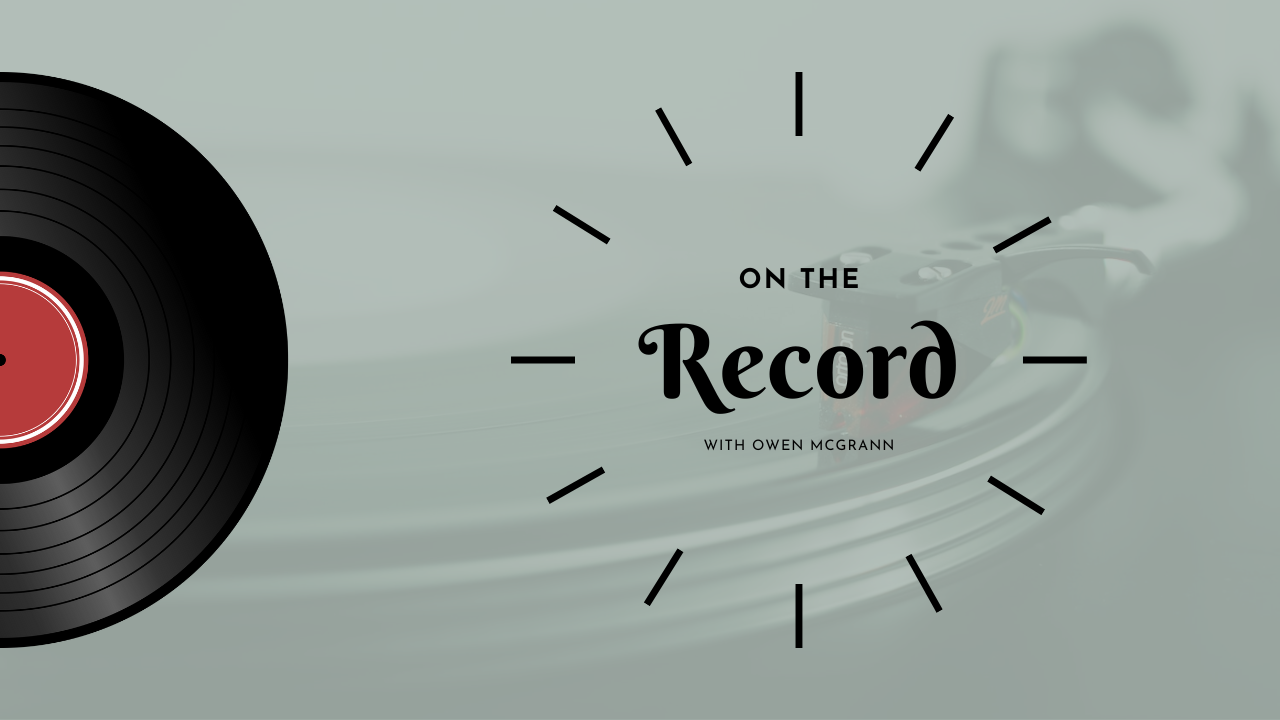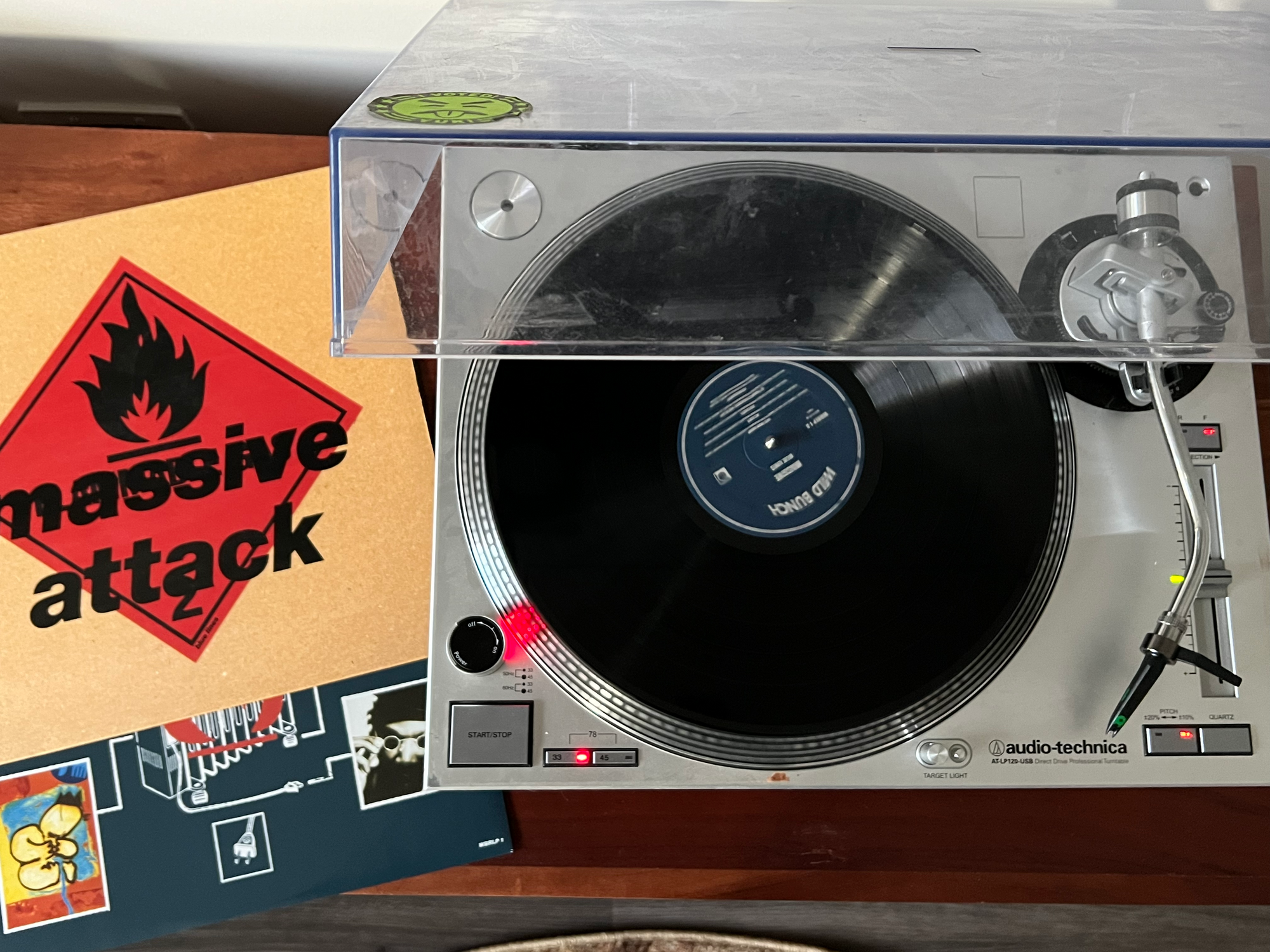OTR, Take 2: Massive Attack - Blue Lines

I woke up this morning with my puppy, Clare, curled up in the curve of my knees and Winnie, my older dog, snoring like a moose on the floor beside the bed. The night before, I’d forgotten to close the blinds and the southerly light sponged through the window, a thousand muffled lamps just out of sight. I felt a liminal promise of morning.
Often, I awake drowsy and grumpy. I stumble through the first half hour of my day until the coffee kicks in. I love the mornings, but it takes some time for my brain to boot up. (An aside: metaphors are powerful and suggestive, but imperfect. My brain doesn’t boot up to run Consciousness OS on a partitioned drive after shutting down Crazy Dreams OS. Anyway.)
That space just after coming to, when taking a slow inventory of your surroundings and the bemusement when nothing is quite as expected – that is the feeling I associate with today’s album: Massive Attack’s debut, Blue Lines.

I've been asked a few times how I decide what to listen to on Saturday mornings, whether I just have a list of my records and am going through them one by one. I am neither that organized nor that disciplined – hello ADHD! When I pick my records on Saturday morning, it's generally a reflection of the mood I'm in, or aspirational to the mood I want to be in. Music is such a powerful conduit of emotion and mental state.
Many of you know that I'm in the process of opening a new firm, Purely Estates Law Group, with Wendy Witt. It's exciting work, even if hard and deliberate work. I've immersed myself in that work and it's coming along nicely. It's pretty fascinating how my approach and process have changed with this new firm, three and a half years after opening McGrannLAW.
Much of my writing on LinkedIn is strident. It has, I hope, a distinct point of view and voice – but I’m not the one to determine that, so who knows? One problem with writing in such a manner is that the feelings of imposter syndrome arise frequently: here I am writing confidently about any number of legal or business matters and in my own businesses I’m making the mistakes that every business owner makes.
One of the things that have been weighing on me is that, in the excitement of starting Purely Estates, I have neglected the pipeline of work for McGrannLAW. I have focused so much on building new (and that includes a reimagining of McGrannLAW) that I've lost track of one of the fundamental tenets of any business: you need to win new deals to turn revenue.
Such a rookie mistake. I get frustrated sometimes with myself and other business owners who puff out our chests and talk about the benefits of being an entrepreneur. Too often, the rhetoric glamorizes our path by bagging on more traditional work paths without acknowledging the very real and apparent benefits that those paths offer.
For instance, my wife brings home a consistent paycheck every two weeks. We know what that is going to be, and we've built our lives around that consistency. Me? There are some months that the money I draw from my firm is a seventh of her take-home pay. There are also months when the money I draw is seven+ times her take-home pay.
Anyway, I've been thinking a lot about how entrepreneurs will talk in abstract terms about "the grind" and how difficult the path can be. (And, god knows, we will never shut up when things are going well...) It's important to be specific about the downsides, too. About the calls to customers regarding the final payment on a payment plan you need to cover payroll. About the pit in your stomach when you realize that you have to fire a customer who owes you well into the five figures, money you will never collect. About a lead magnet that you are super excited about and put money behind that doesn't return a single lead.
Blue Lines is a record that reflects my present mood. It is low-key intense. Reflective, boastful, apprehensive, and quietly confident. Massive Attack dropped Blue Lines out of nowhere in 1991. Some of the members were lurking in the UK scene, two of them appeared on credits for a Neneh Cherry song. But Blue Lines was wholly unexpected when it was released in April 91.
I was 10 in 1991, so my actual recollection of a touchstone music year for me amounts to hearing lots of Paula Abdul on the radio. 1991 saw the release of some of my favorite albums: My Bloody Valentine’s Loveless, A Tribe Called Quest’s The Low End Theory, Slint’s Spiderland. I came to all of these years later. (91 was also the annus mirabilis for grunge, but that has never been my thing.)
I remember exactly where I was when I first heard each of those albums, but I have no recollection of where I was when I first heard Blue Lines, which is somehow fitting: there’s something disorienting and just-out-of-reach about the music. Listening to it this morning, I can hear the roots of so many musical styles and movements that came years and sometimes decades later. (Some, like the bass and drum opening of Bush’s “Comedown” straddles the line between hat-tip and straight theft of “Safe From Harm.”)
Many of you will be familiar with the perfection of "Unfinished Sympathy," which is far and away the most famous track from Blue Lines. Hearing in the context of the record, though, is a different experience. If you've never written songs or recorded an album, you probably haven't given much thought to the composition of an album. Writing a song is like writing a short story: it needs to be a concise statement, wholly encapsulated in a few short minutes. Writing an album is something else entirely, more akin to writing a novel – and as Henry James always sez, novels are loose, baggy monsters.
Writing a great album is tremendously difficult to do. It's not just writing 10 to 15 songs, recording them, and selecting a tracklist comprised of those songs. Some musicians do it that way, but it's generally trash. An album as a whole has to be cohesive in terms of mood, message, intent. One of the most powerful storytelling techniques for crafting albums is lost when we listen to albums in digital format: the transition from side one to side two.
Flipping the sides of a record forces you to get up and intentionally interact with the music. Imagine listening to Abbey Road for the first time and sitting through "She's So Heavy," the weight and atmosphere of that song lifted as you let the needle down on "Here Comes the Sun." It's a magical transition that just isn't the same when listening on Tidal or CD.
Although not as pronounced, "Unfinished Sympathy" opens side two of Blue Lines and shifts from the quasi-reggae vibe of "Five Man Army" to something more sincere, something deeper in the soul. When that drumbeat kicks in, the strings build, and Shara Nelson's voice slices in...man.
Like a soul without a mind/in a body without a heart/I'm missing every part
I come back to Blue Lines again and again for this transition, for the grounding that "Unfinished Sympathy" offers. It helps me feel ready. Ready to put mistakes behind me. Ready to embrace the opportunities before me. Ready to enjoy a perfect autumn day in Pittsburgh.
Hope you all have a wonderful weekend! I'm off to the dog park!
Member discussion